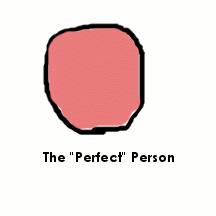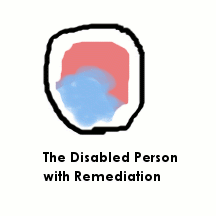
The prevailing cultures in which we live have been sold the idea that there is a "perfect" person. This idea pervades every aspect of our lives and is defined by corporations, government, media, and ourselves. These things set the boundary (that black one in the picture) where people are expected to live within. You, with the help of all the institutions we create to service or rule us, are expected to fill in the defined space (the rose colored stuff) and be a competent, useful person, as society defines this. Are you not smart enough? You need more school. Are you not rich enough? You need to get a better job. Can you not hear music in your ears everywhere you go? You need an mp3 player! These are a few of the numerous expectations that society has for you and to be a good member of society you are expected to meet them all as an adult.
Society's expectations of what a person should be can be compared with a cookie cutter (the black line). People are expected to fill that cookie cutter completely, which is what a lot of people call being "well-rounded". The ideal goal in our society is to be well rounded, which is to have some ability or interest in all acceptable and anticipated areas and no serious deficits anywhere. Our society assumes that nearly everyone has (or should have) sufficient dough (or ability) to fill in the established cookie cutter expectations.

There are some people who don't seem to have enough ability to meet society's expectations. This is like having too little dough available to fill up the cookie cutter form. Society has a label for that problem: disability.
As a disabled person, you are deficient somewhere and that is a problem for everyone. Other people feel badly about the fact that your cookie cutter is not filled in everywhere and they want to “help”. Society has decided to form entire industries for the purpose of trying to make disabled people more "perfect".

Our society has decided that there is one way to fix disabled people: remediation. If you cannot fill in the cookie cutter society has designed, outside help is required in the form of medicine, psychology, therapy, and other interventions. The goal is still to make a person well-rounded, but if that cannot be accomplished, the most important thing is to make the person “look” more round to outside observers. If a disabled person is good at something, it is often ignored in favor of working very hard to address the things a person is not good at. Essentially, remediation is an attempt to steal dough from “unwanted” places to fill in blank spots within cookie-cutter expectations.

There is an interesting sort of person that we will call Xenos. It is an ancient Greek term for a stranger or alien (to one's village). These people are obviously very different from "perfect" people, much like the disabled are different. For the most part, a Xenos person would have the same amount of ability as the "perfect" person, it is just distributed differently. A Xenos is someone who focuses on one facet of life, often has greater than normal ability and interest in it, and typically has shortcomings in other areas of life. This person is often called "obsessive". For the Xenos, this obsessive nature is inherited and cannot really be eliminated, though it can be hidden by "behavioral training" or “healing” obvious and socially-disquieting quirks out of a person.
Fortunately for everyone, these Xenos people can often learn to steer their obsessive abilities toward interests that make the world a better place. It was Xenos-type people who created industrialization, telephones, the light bulb, radio, television, nuclear energy, computers, and ultimately iPods and iPhones, as examples. No one can doubt that people like Albert Einstein, Thomas Edison, and Bill Gates are pretty obsessive and odd and were able to do things that normal people cannot do or would have never thought of doing. Thankfully, many people were willing to ignore Einstein's unkempt hair and interesting mannerisms and focus instead on his theory of relativity!
Unfortunately for the Xenos, society doesn't like obsessiveness particularly. It gets in the way of making people well-rounded. Society's institutions (think about schools as an example) are designed to produce and service people whose ability and interests fit into the established societal cookie cutter. A Xenos person will have serious problems and cause serious problems when faced with a world (such as ours) that is heavily and inflexibly oriented toward institutional well-roundedness.
You can see in the picture above that there is some dough outside the black line. This is the indication of someone obsessively pursuing an interest or ability beyond what is considered normal and acceptable. To make up for things required to follow an obsession, material is missing from other facets of life. Often, the Xenos person is poor at mundane everyday tasks like hygiene and may lack common sense or common manners. In a typical Xenos, the basic dough (or level of interest or ability) is roughly the same as (or greater than that) in a "perfect" person; it is just distributed differently, some of it outside of the cookie cutter definition of what is normal and acceptable.
Our society grows more and more myopic and can only see value in what is considers to be normal and (frankly) profitable. If you were to cover over the dough that is outside the black circle in the picture, the Xenos person looks just like the disabled person - someone who doesn't have their cookie cutter filled in. To most people, a Xenos person is considered disabled, being practically unable to see ability outside of the boundaries of social normalcy.

It is important to remember that society controls not only the way things are done but the institutions created to do and run things. There is really only one cookie-cutter definition of normal and there is really only one established way of dealing with things that are not normal: remediation. Therefore, Xenos people end up being put through the same people, institutions, and processes that disabled people face. "Johnny, I want you to stop designing the next Mars rover and sit with the therapist and practice blowing your nose properly. It is much more important to fit in with the other kids than it is to win the Nobel Prize in physics."
Most disability professionals would excitedly attack that unsightly blob of "wasted" ability outside the established circle in the picture above and chew up someone's childhood or entire life trying to fill in that missing place in the cookie cutter that dictates how well one holds their fork. Thank goodness there were no therapists engaged in fixing Einstein - who knows how much we would have lost!
It is important to note that there can be truly disabled people among the Xenos, just as there are among typical people. These disabled Xenos are often labeled "autistic". I am sure you can see the picture in your mind of the cookie-cutter and a small amount of cookie dough stretched out toward some obsession, resulting in very little lying inside the circle. There is some need for therapists and doctors and psychologists for those people, with an understanding that you cannot beat or drug the obsession out of the Xenos, only help channel obsessive behavior toward something positive. A helper's focus can be better set toward expanding existing ability to help the Xenos achieve their potential to go where no normal person could ever go!
